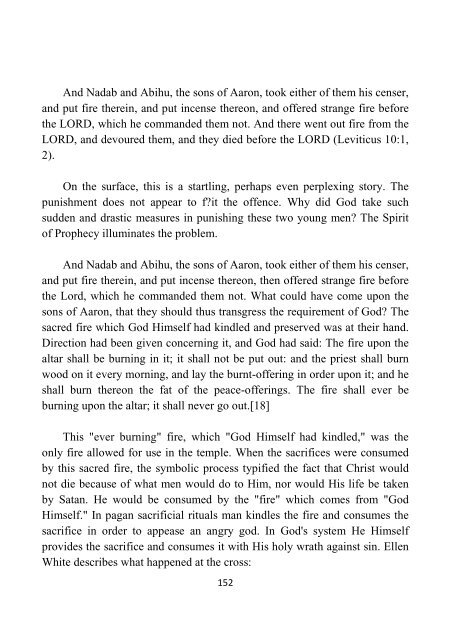Message of the Latter Rain - Kelvin M. Duncan
You also want an ePaper? Increase the reach of your titles
YUMPU automatically turns print PDFs into web optimized ePapers that Google loves.
And Nadab and Abihu, <strong>the</strong> sons <strong>of</strong> Aaron, took ei<strong>the</strong>r <strong>of</strong> <strong>the</strong>m his censer,<br />
and put fire <strong>the</strong>rein, and put incense <strong>the</strong>reon, and <strong>of</strong>fered strange fire before<br />
<strong>the</strong> LORD, which he commanded <strong>the</strong>m not. And <strong>the</strong>re went out fire from <strong>the</strong><br />
LORD, and devoured <strong>the</strong>m, and <strong>the</strong>y died before <strong>the</strong> LORD (Leviticus 10:1,<br />
2).<br />
On <strong>the</strong> surface, this is a startling, perhaps even perplexing story. The<br />
punishment does not appear to f?it <strong>the</strong> <strong>of</strong>fence. Why did God take such<br />
sudden and drastic measures in punishing <strong>the</strong>se two young men? The Spirit<br />
<strong>of</strong> Prophecy illuminates <strong>the</strong> problem.<br />
And Nadab and Abihu, <strong>the</strong> sons <strong>of</strong> Aaron, took ei<strong>the</strong>r <strong>of</strong> <strong>the</strong>m his censer,<br />
and put fire <strong>the</strong>rein, and put incense <strong>the</strong>reon, <strong>the</strong>n <strong>of</strong>fered strange fire before<br />
<strong>the</strong> Lord, which he commanded <strong>the</strong>m not. What could have come upon <strong>the</strong><br />
sons <strong>of</strong> Aaron, that <strong>the</strong>y should thus transgress <strong>the</strong> requirement <strong>of</strong> God? The<br />
sacred fire which God Himself had kindled and preserved was at <strong>the</strong>ir hand.<br />
Direction had been given concerning it, and God had said: The fire upon <strong>the</strong><br />
altar shall be burning in it; it shall not be put out: and <strong>the</strong> priest shall burn<br />
wood on it every morning, and lay <strong>the</strong> burnt-<strong>of</strong>fering in order upon it; and he<br />
shall burn <strong>the</strong>reon <strong>the</strong> fat <strong>of</strong> <strong>the</strong> peace-<strong>of</strong>ferings. The fire shall ever be<br />
burning upon <strong>the</strong> altar; it shall never go out.[18]<br />
This "ever burning" fire, which "God Himself had kindled," was <strong>the</strong><br />
only fire allowed for use in <strong>the</strong> temple. When <strong>the</strong> sacrifices were consumed<br />
by this sacred fire, <strong>the</strong> symbolic process typified <strong>the</strong> fact that Christ would<br />
not die because <strong>of</strong> what men would do to Him, nor would His life be taken<br />
by Satan. He would be consumed by <strong>the</strong> "fire" which comes from "God<br />
Himself." In pagan sacrificial rituals man kindles <strong>the</strong> fire and consumes <strong>the</strong><br />
sacrifice in order to appease an angry god. In God's system He Himself<br />
provides <strong>the</strong> sacrifice and consumes it with His holy wrath against sin. Ellen<br />
White describes what happened at <strong>the</strong> cross:<br />
152

















